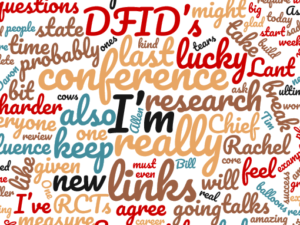Hi all,
Sorry this one is so late (and verbose)! I’ve been at DFID’s economics conference for the last few days, and have just dealt with the annual nightmare journey back home. As a result, I’ve had very little time to really keep my usual eagle eye on the rumblings of the internet, so this week’s links are a bit more sparse and tired than they usually are. But your loss was my gain: lots of phenomenal speakers, new ideas and a lot of argument that we’ll take back to our jobs.
It was also Stefan Dercon’s last appearance there as DFID’s Chief Economist. Over the years he’s given some absolute blockbuster talks, incorporating Asterix, lions and peacocks, and minor Asian fish. But as was noted in an appreciation given by Nick Lea, his deputy, the real measure of his influence is that DFID’s take on virtually every substantive topic we covered in this conference and those of recent years have been fundamentally shaped by his thinking and influence on the corps of economists which he leads; and collectively they represent the vast majority of what we do. He’s been totally inspirational, and we’ve been lucky to have him.
- We’re also really lucky to have appointed Rachel Glennerster as our new Chief Economist (from January). She opened the conference, and one of Rachel’s points was that the experimental revolution has created a channel through which research is effectively being translated into policy and doing a tremendous amount of good in the world. But should this evidence of scaling up really be the measure of their worth? In an article which Rachel would probably agree with, Alejandro Ganiman suggests that the contribution to what we know about development that RCTs have achieved has been far greater than scale-up estimates would suggest.
- We also had noted contrarian Lant Pritchett at the conference, and Lant likes to blow things up. His own aversion to the kinds of questions that RCTs ask is well documented, and he indulged in it in his keynote address (a barn-burner, complete with tears over the genius of Bill Russell, balloons, sacred cows being taken to the slaughterhouse and a reassessment of Allen Iverson). One of his concerns is that especially as we start working in harder and harder environments, research effort will be devoted to smaller questions that feel easier to answer, not the really big ones that will determine the ultimate success or failure of development in these places. He must be glad for people like Daron Acemoglu, here talking about Colombia as an example of how not to build a state, even if he probably doesn’t agree with all his conclusions.
- It was kind of amazing to have three such brilliant and different thinkers giving their ‘state of the discipline’ addresses to us. But not everyone is going to be so lucky – and for the rest of us, there is a new economics core curriculum available online and free. New Yorker review here.
- Tim Harford would have been the icing on the cake, but sadly no dice this year. He talks about disaster preparedness here, but from the perspective of individual biases. Again, his ability to explain so much of the discipline so clearly amazes me.
And that’s all from me today. I’m off on leave next week so no links again until the end of September. That might actually be the last links e-mail for a while: I’m taking a short career break to study again (apparently, I don’t feel like I spend enough time reading research). I’m planning to keep these links going while I’m on my break, but it might require a bit of negotiation to keep this laptop, and hence my contact book!
Have a great weekend, everyone!
R

